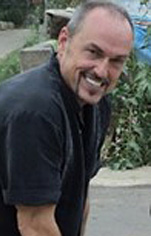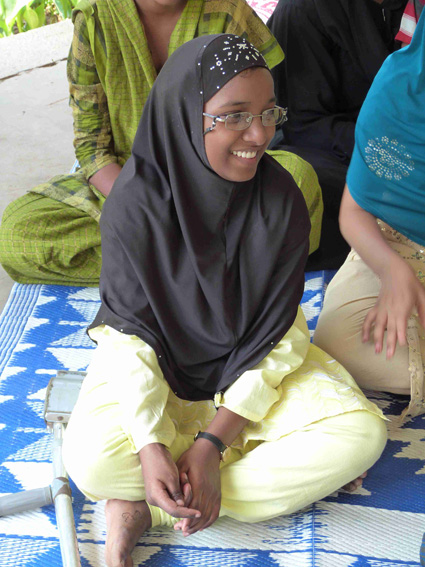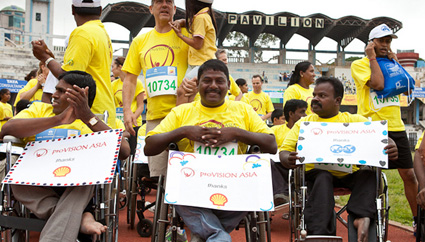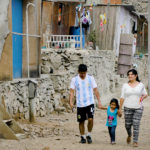Muniswamy, a 14-year-old disabled by polio in infancy, moved up and down the dusty streets of Bangalore, India, on a small, wooden, four-wheeled platform.
“With a smile as big as the sun, he tended his uncle’s goats, who led him along the road,” said Chip Kingery, who recalled how the young man traveled by his home in Bangalore every morning in 1988. “His hands were calloused from the constant contact with the graveled road but his spirit undiminished.”
 Chip KingeryKingery and his wife, Jean, responded to “Muni’s” needs and began inviting him and other “differently abled” individuals into their home. As a result of those friendships, the Kingerys founded proVision Asia to inspire hope among people with disabilities, specifically in southern India.
Chip KingeryKingery and his wife, Jean, responded to “Muni’s” needs and began inviting him and other “differently abled” individuals into their home. As a result of those friendships, the Kingerys founded proVision Asia to inspire hope among people with disabilities, specifically in southern India.
Today, Muni manages the organization’s “Ability Connection” program, which bridges community resources and people with disabilities to make available medical treatment and rehabilitation, as well as provide government advocacy. He is a husband, father of two boys and a “natural” in sharing the hope of Jesus Christ, Kingery said.
ProVision Asia, supported by the Texas Baptist Hunger Offering, serves up to five families per day and provided 75 mobility aids to disabled people over the last quarter. Additionally, it placed 20 people with disabilities in well-established corporations or start-up companies last quarter.
The organization recently provided crutches for Alfiya, a 14-year-old girl who suffers from paralysis on the right side of her body. She struggles with walking and other basic functions. Although many children with disabilities are treated with disdain in India, Alfiya lives a joyful life and is encouraged by her mother to succeed in spite of her disability, Kingery said.
 Through a sponsorship with proVision Asia, Alfiya, a disabled 14-year-old, is attending school for free in Bangalore, India.Alfiya’s story illustrates the transformation proVision Asia can bring to entire families, not just individuals.
Through a sponsorship with proVision Asia, Alfiya, a disabled 14-year-old, is attending school for free in Bangalore, India.Alfiya’s story illustrates the transformation proVision Asia can bring to entire families, not just individuals.
“For someone like Alfiya, this makes the difference between sitting all day long without exercise” and living a mobile life, Kingery said. “For her mom, there is freedom from carrying the child on her hip to move her from place to place. Often, our ministry is to the parents, especially mothers, who become the sole mode of transportation for the child.”
Disabled people in India typically find education difficult to obtain, and Alfiya’s parents feared she would not be able to attend school. ProVision Asia seeks community involvement in the lives of children who need education by negotiating with schools to provide lower fees. Through a sponsorship with proVision Asia, Alfiya is attending school for free in Bangalore and is a B+ student in the 10th grade.
Sign up for our weekly edition and get all our headlines in your inbox on Thursdays
In light of the poverty prevalent in Bangalore, parents often must choose between feeding their children or educating them, Kingery said.
Alfiya’s father is self-employed as a vegetable vendor, and the money he earns goes toward the family’s basic necessities. Since her parents do not have to pay for Alfiya’s education, they are more able to focus on feeding the family, made possible through the support of Texas Baptists, Kingery noted.
 Some of the disabled who are being helped by ProVisionAsia make an appearance at Bangalore’s World 10k race.“Texas Baptists have enabled us to minimize that choice—families can be helped to send their children to school, and therefore do not have to choose between education and providing basic necessities like food,” he said.
Some of the disabled who are being helped by ProVisionAsia make an appearance at Bangalore’s World 10k race.“Texas Baptists have enabled us to minimize that choice—families can be helped to send their children to school, and therefore do not have to choose between education and providing basic necessities like food,” he said.
Alfiya and her family are among about 100 participants in proVision Asia’s Saturday playgroup, where children with disabilities, accompanied by their parents and siblings, participate in recreation at a large park.
“A child like Alfiya can come to the park with her parents and spend a fun morning with singing, stories, crafts and personal counseling,” Kingery said. “This is where we are able to extend the love of Christ in action and in word and then follow up with these families affected by disability.”
In addition to providing medical equipment and quality education to the disabled, proVision Asia provides medical assistance to people with disabilities.
The organization’s rehabilitation center offers children and adults the opportunity to receive physiotherapy and mobility aids each month. The center treats patients with cerebral palsy, post-polio residual palsy, post-operative fractures, post-traumatic stiffness, mental retardation and paralysis.
The center recently focused on basic diabetes training, because Kingery estimated one-third of the patients have amputations due to diabetes. The center shares resources and expertise with other nongovernmental organizations and hospitals to ensure the most successful rehabilitation of the patient.
A partnership with Joni and Friends, a disability ministry in California, allows proVision Asia to minister to prison inmates. Used wheelchairs, walkers and crutches collected by the organization are shipped to proVision Asia and refurbished by inmates at a unit in the Bangalore Central Prison.
As a result, a church has started at the prison, and a team of 14 inmates lead a Bible study each day for many other inmates. Additionally, proVision Asia has distributed solar-powered, electronic Bibles in the prison, which houses more than 5,000 inmates.
By 2030, India will comprise the largest population on the planet, and less than 4 percent are Christians, Kingery said. Additionally, more than 15 percent of people in India are affected by disability and “deserve to know that they are indeed created in the image of God,” he noted.
Kingery expressed gratitude to Texas Baptists for their help and exhorted them to continue giving their donations, time and effort to the ministry.
“Specifically, we need people trained in special education to help us address these needs—and though funds go a long way here, the needs are always much greater than our bank account,” he said. “We are grateful that Texas Baptists, especially through the world hunger offerings, have enabled us to reach more deeply into the lives of people affected by disability.”















We seek to connect God’s story and God’s people around the world. To learn more about God’s story, click here.
Send comments and feedback to Eric Black, our editor. For comments to be published, please specify “letter to the editor.” Maximum length for publication is 300 words.